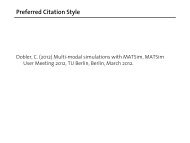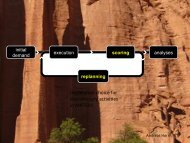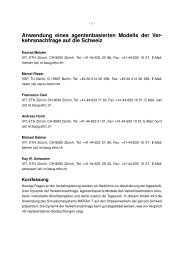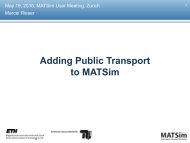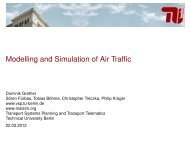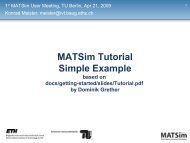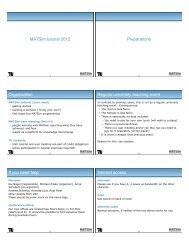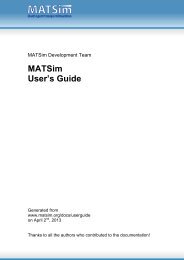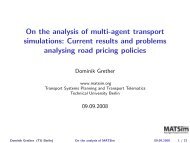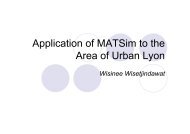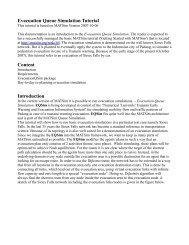Stefan Schröder - Simulating Carriers - MATSim
Stefan Schröder - Simulating Carriers - MATSim
Stefan Schröder - Simulating Carriers - MATSim
You also want an ePaper? Increase the reach of your titles
YUMPU automatically turns print PDFs into web optimized ePapers that Google loves.
<strong>Simulating</strong> carriers: time-dependent vehicle routing<br />
<strong>MATSim</strong> User Meeting 2012,<br />
<strong>Stefan</strong> <strong>Schröder</strong> (stefan.schroeder@kit.edu)<br />
Institut für Wirtschaftspolitik und Wirtschaftsforschung (IWW) Fachgebiet Netzwerkökonomie<br />
KIT – Universität des Landes Baden-Württemberg und<br />
nationales Großforschungszentrum in der Helmholtz-Gemeinschaft<br />
www.kit.edu
Agenda<br />
! Motivation<br />
! Problem<br />
! Algorithm<br />
! Case Study<br />
! Conclusion<br />
2 23.03.2012<br />
IWW
Motivation<br />
research project: conceptual and concrete contribution to behavioral<br />
freight modeling<br />
concept and test-implementation of multi-tiered freight framework<br />
(e.g. shipper, transport service provider and carrier)<br />
streamlining of carrier layer new <strong>MATSim</strong> agent<br />
3 23.03.2012<br />
IWW
Motivation<br />
Passenger traffic:<br />
persons conduct activities (=> travel through space => traffic)<br />
individual calculus: maximize utility, activity duration (+), travel time (-)<br />
typical decisions: route choice, activity sequence, mode choice<br />
Freight traffic:<br />
carriers offer transport services (=> travel through space => traffic)<br />
calculus: minimize costs, activity duration (-), travel time (-)<br />
typical decisions: route choice, activity sequence, vehicle scheduling,<br />
mode choice<br />
4 23.03.2012<br />
IWW
Motivation<br />
How to model route choice, activity sequence and vehicle<br />
scheduling decisions consistently<br />
Consistent<br />
given information about traffic system, decisions are made such<br />
that total costs are minimized<br />
Time-dependent vehicle router coupled with physical simulation<br />
of <strong>MATSim</strong><br />
5 23.03.2012<br />
IWW
Agenda<br />
! Motivation<br />
! Problem<br />
! Algorithm<br />
! Case Study<br />
! Conclusion<br />
6 23.03.2012<br />
IWW
Vehicle Routing Problem<br />
Problem<br />
Solution<br />
Source: http://neo.lcc.uma.es/radi-aeb/WebVRP/<br />
Single Depot VRP with capacity constraints<br />
7 23.03.2012<br />
IWW
Vehicle Routing Problem - Variety<br />
VRP type<br />
Capacitated (CVRP)<br />
Time Windows (VRPTW)<br />
Pickup and Delivery (VRPPD)<br />
Multiple Depots (VRPMD)<br />
Heterogeneous Fleet (VRPHF)<br />
CVRPTWPDMDHF<br />
...<br />
Costs<br />
Constant costs<br />
Time-dependent costs<br />
Demand<br />
Deterministic<br />
Stochastic<br />
Problem type<br />
Combinatorial problem<br />
Search space grows fast with #nodes<br />
Solution approaches<br />
Exact:<br />
Branch-and-Bound, Branch-and-Cut, ...<br />
(Meta)Heuristics:<br />
Tabu Search, Simulated Annealing, ...<br />
Initial solution<br />
Search through neighborhood<br />
8 23.03.2012<br />
IWW
Agenda<br />
! Motivation<br />
! Problem<br />
! Algorithm<br />
! Case Study<br />
! Conclusion<br />
9 23.03.2012<br />
IWW
Algorithm – Ruin-and-Recreate Principle<br />
Schrimpf et al. (2000) ★ ,<br />
(1) can be implemented as general framework, (2) simple operations<br />
Initial Solution<br />
Initial plan (vehicle routes)<br />
Ruin<br />
Remove customer from plan<br />
Recreate<br />
Re-Insert customer to plan<br />
Threshold Accepting<br />
Evaluate solution<br />
Final Solution<br />
★<br />
Record Breaking Optimization Results Using the Ruin and Recreate Principle,<br />
Gerhard Schrimpf,∗ Johannes Schneider,† Hermann Stamm-Wilbrandt,∗ and Gunter<br />
Dueck∗, Journal of Computational Physics, 2000.<br />
10 23.03.2012<br />
IWW
Algorithm – Ruin-and-Recreate<br />
Initial Solution<br />
Ruin<br />
Random Ruin (p=0.5,#customer=0.5)<br />
Radial Ruin (p=0.5,#customer=0.3)<br />
Recreate<br />
Best Insertion (min. marginal cost)<br />
Threshold Accepting<br />
Final Solution<br />
NewSolution.result < OldSolution.result + T<br />
T 0<br />
T = T 0<br />
* exp(−ln2* x<br />
0.1 )<br />
Determined by random walk<br />
€ Tolerant (1.Iteration) Greedy (last Iter.)<br />
€<br />
11 23.03.2012<br />
IWW
Algorithm – Radial Ruin<br />
Source: Schrimpf et. al (2000)<br />
Select customer randomly<br />
Identify neighborhood<br />
(e.g. time, space)<br />
Ruin neighborhood<br />
=> List of customers not<br />
served<br />
Re-insert customers<br />
subject to constraints<br />
(where MC is minimal)<br />
12 23.03.2012<br />
IWW
Algorithm – Time-dependency<br />
Time-dependent marginal costs are additional costs attributed to<br />
inserted customer<br />
MC(h)=c(i,h,depTime@i) + c(h,j,depTime@h) – c(i,j,depTime@i) + Δ<br />
Δ = changes in travel time due to changes in departure times at<br />
subsequent customers<br />
Time-dependent travel times <strong>MATSim</strong>‘s TDSPA<br />
13 23.03.2012<br />
IWW
Algorithm – Implementation & Verification<br />
Implementation in JAVA, available at contrib.freight.vrp<br />
Verification on test instances:<br />
Christophides, Mingozzi and Toth (CVRP)<br />
Solomon (CVRPTW)<br />
Li and Lim (CVRPTWPD)<br />
14 23.03.2012<br />
IWW
Agenda<br />
! Motivation<br />
! Problem<br />
! Algorithm<br />
! Case Study<br />
! Conclusion<br />
15 23.03.2012<br />
IWW
Case – Goals<br />
Illustrate VRP-algorithm<br />
Several carrier vehicles can be simulated along with<br />
passenger vehicles<br />
<strong>Carriers</strong> can pickup congestion and adapt to changes in the<br />
traffic system (they have plan strategies)<br />
<strong>Carriers</strong> can score plans and have plan memory<br />
16 23.03.2012<br />
IWW
Case – Setup<br />
Network:<br />
Link-Cap: 7 Veh/h<br />
Broadway-Link-Cap: 10 Veh/h<br />
Outer ring: 10 Veh/h<br />
Free-Speed: 50km/h<br />
Depot i<br />
W<br />
A<br />
W<br />
A<br />
Depot j<br />
Persons:<br />
#Persons: 400<br />
Activities.: home, work<br />
Locations<br />
Departure Home: 7:00 – 10:00<br />
Departure Work: 15:00 – 18:00<br />
<strong>Carriers</strong>:<br />
#<strong>Carriers</strong>: 10<br />
Location<br />
#Shipments: UD[10-40]<br />
Shipment size: UD(0-10]<br />
#Vehicles: 10; Vehicle Cap: 40<br />
Small Delivery TW: 30 min., UD<br />
[08:00am-12:00am]<br />
Operation-Start: UD[6:30am<br />
-8:30am]<br />
Simulation:<br />
#Iterations: 100<br />
17 23.03.2012<br />
IWW
Case – Simulation<br />
Initial Plans<br />
Vehicle routing based on empty road network (initialize routers)<br />
Simulation<br />
BeforeSim: Drivers are created from carrier plans<br />
Scoring<br />
score = −50 €/h * hours −1€/km * km −1000 €/h * hours_ tooLate<br />
Re-Planning<br />
−100 €/vehicle * vehicles<br />
€<br />
Persons:<br />
Best-Plan (0.95)<br />
Re-Route (0.05)<br />
<strong>Carriers</strong>:<br />
Best-Plan (0.9)<br />
Re-Schedule (0.05)<br />
Re-Route (0.05)<br />
select best carrier-plan<br />
transform best plan into initial solution for<br />
ruin-and-recreate algorithm<br />
do td-vehicle-routing on loaded network of the<br />
last iteration<br />
re-transform result into carrier-plan<br />
18 23.03.2012<br />
IWW
Case – Carrier Score<br />
Starting with bad score; initial<br />
plans made on empty road<br />
network<br />
Due to congestion, carriers<br />
miss almost every time window<br />
In the course of iterations,<br />
carrier can adapt to traffic<br />
conditions<br />
Total score can be increased<br />
by 78% ( costs of carriers)<br />
Red line: sum of best scores; Green line: sum of scores of executed plan; Blue: Avg. plan score per agent<br />
19 23.03.2012<br />
IWW
Case – Carrier Time<br />
Initial plan: Almost every time<br />
window missed<br />
Adaptations lead to a decrease<br />
of time too late<br />
Time on road can be reduced<br />
by 34%<br />
When late time decreases,<br />
waiting time increases slightly<br />
Red: total duty time; Green: total time on road; Blue: total waiting time; Yellow: total time too late<br />
20 23.03.2012<br />
IWW
Case – Verification<br />
0<br />
-50000<br />
1 11 21 31 41 51 61 71 81 91 101<br />
Green: improvements<br />
attributed to passengers<br />
Re-routing little better than<br />
doing nothing<br />
-100000<br />
-150000<br />
-200000<br />
noStrat<br />
reRoute<br />
reSchedule<br />
Re-scheduling is superior (30%<br />
better than other strat.)<br />
Re-Route: +2% computation<br />
time<br />
Re-Schedule: +26%<br />
computation time<br />
-250000<br />
sum of best scores<br />
21 23.03.2012<br />
IWW
Agenda<br />
! Motivation<br />
! Problem<br />
! Algorithm<br />
! Case Study<br />
! Conclusion<br />
22 23.03.2012<br />
IWW
Conclusion<br />
VRP library that can solve a variety of vehicle routing problems<br />
Carrier as new <strong>MATSim</strong>-Agent who can consistently consider changes in the<br />
traffic system<br />
<strong>MATSim</strong>-Agent that manages and employs a vehicle fleet<br />
Optimization of the operations of the number of vehicles vs. of a single<br />
vehicle => varying number of simulated vehicles<br />
Decision support system in City-Logistics<br />
From economic point of view, it is interesting for single logistics decision makers<br />
One step to modeling freight traffic<br />
23 23.03.2012<br />
IWW
Conclusion<br />
Challenges:<br />
How to calibrate a vehicle router (an optimization problem with constraints)<br />
empirically (here: normative model with assumption of complete<br />
information of the modeler)<br />
Need for tools like we have in discrete choice theory<br />
Thank you for your attention!<br />
24 23.03.2012<br />
IWW
Backup<br />
Large-scale scenarios<br />
Computation time: very good vs. good results<br />
Comp.Time: TD Shortest Path Algo<br />
Memory consumption: RR requires travel times from all customers to<br />
all customers => n*n*timeSlices (n = #customers)<br />
25 23.03.2012<br />
IWW
Backup – Solomon’s benchmarking (TW,100)<br />
- Converge to best known<br />
solution<br />
- Marginal costs increase<br />
- Very good solution are<br />
expensive<br />
- Good solutions are<br />
affordable<br />
26 23.03.2012<br />
IWW
Backup – Food Retailing<br />
<br />
<br />
<br />
<br />
<br />
Synthrade Hanno Friedrich<br />
Closing the gap between inter-regional and intra-regional models<br />
Evaluation of policy (city logistics) measures and impact<br />
assessment of food retailing<br />
Impact of E-retailing (REWE)<br />
Connecting consumers‘ demand with freight logistics<br />
27 23.03.2012<br />
IWW
Backup – Broadway with more cap<br />
28 23.03.2012<br />
IWW
Backup – Broadway with more cap<br />
29 23.03.2012<br />
IWW
Vehicle Routing Problem - CarrierPlan<br />
Problem<br />
Solution<br />
...<br />
30 23.03.2012<br />
IWW
Case – Along with passenger<br />
<br />
<br />
CarrierAgentTracker keeping track of Drivers initiated by <strong>Carriers</strong><br />
CarrierAgentTracker listens to Mobsim-Events and informs<br />
respective carriers<br />
31 23.03.2012<br />
IWW
Case – Bad initial solution<br />
0<br />
1<br />
6<br />
11<br />
16<br />
21<br />
26<br />
31<br />
36<br />
41<br />
46<br />
51<br />
56<br />
61<br />
66<br />
71<br />
76<br />
81<br />
86<br />
91<br />
96<br />
101<br />
-50000<br />
-100000<br />
-150000<br />
-200000<br />
noStrat<br />
reRoute<br />
reSchedule<br />
-250000<br />
-300000<br />
-350000<br />
32 23.03.2012<br />
IWW
Vehicle Routing Problem – CVRP Formal<br />
min<br />
∑<br />
∑<br />
r∈K (i, j )∈A<br />
r<br />
c ij<br />
x ij<br />
Min. costs<br />
€<br />
s.t.<br />
∑<br />
j∈N +<br />
∑<br />
r∈K<br />
∑<br />
i∈N +<br />
∑<br />
i∈N +<br />
∑<br />
i∈N +<br />
∑<br />
i∈N<br />
x r ij<br />
= y r i<br />
, i ∈ N, r ∈K,<br />
y i r =1, i ∈ N,<br />
r<br />
x ih<br />
r<br />
x 0i<br />
−<br />
r<br />
x i(n +1)<br />
∑<br />
j∈N +<br />
r<br />
x hj<br />
=1, r ∈K,<br />
q i<br />
y i r ≤ Q,<br />
=1, r ∈K,<br />
= 0, h ∈ N, r ∈K,<br />
r ∈K<br />
Every customer is served only once<br />
Tour is consistent, flow equation<br />
Capacity restriction<br />
r<br />
x ij<br />
y i<br />
r<br />
c ij<br />
Q<br />
binary, (i, € j) ∈ A, r ∈K<br />
binary, i ∈ N, r ∈K<br />
transport costs from customer i to j<br />
Vehicle − capacity<br />
q i<br />
K<br />
A<br />
N<br />
demand of customer i<br />
set of routes<br />
set of arcs<br />
set of customer<br />
€<br />
33 23.03.2012<br />
€<br />
IWW



